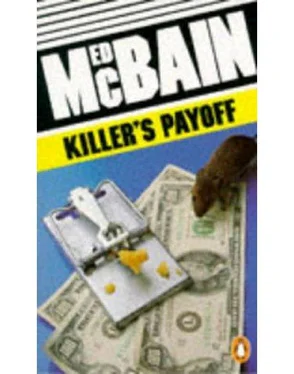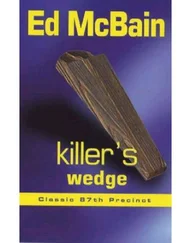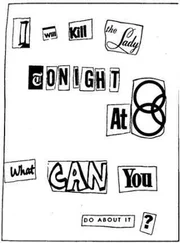McBain, Ed - Killer's Payoff
Здесь есть возможность читать онлайн «McBain, Ed - Killer's Payoff» весь текст электронной книги совершенно бесплатно (целиком полную версию без сокращений). В некоторых случаях можно слушать аудио, скачать через торрент в формате fb2 и присутствует краткое содержание. Жанр: Полицейский детектив, на английском языке. Описание произведения, (предисловие) а так же отзывы посетителей доступны на портале библиотеки ЛибКат.
- Название:Killer's Payoff
- Автор:
- Жанр:
- Год:неизвестен
- ISBN:нет данных
- Рейтинг книги:5 / 5. Голосов: 1
-
Избранное:Добавить в избранное
- Отзывы:
-
Ваша оценка:
- 100
- 1
- 2
- 3
- 4
- 5
Killer's Payoff: краткое содержание, описание и аннотация
Предлагаем к чтению аннотацию, описание, краткое содержание или предисловие (зависит от того, что написал сам автор книги «Killer's Payoff»). Если вы не нашли необходимую информацию о книге — напишите в комментариях, мы постараемся отыскать её.
Killer's Payoff — читать онлайн бесплатно полную книгу (весь текст) целиком
Ниже представлен текст книги, разбитый по страницам. Система сохранения места последней прочитанной страницы, позволяет с удобством читать онлайн бесплатно книгу «Killer's Payoff», без необходимости каждый раз заново искать на чём Вы остановились. Поставьте закладку, и сможете в любой момент перейти на страницу, на которой закончили чтение.
Интервал:
Закладка:
“Are there some rough fellows in this, Hall?”
“I’ll tell you the truth, I don’t know. That’s the truth. I don’t usually assist bul—detectives, but this time I think you’re barkin’ up the wrong tree. If this was a rackets thing, I woulda heard about it. And I didn’t hear nothin’.”
“There’s another possibility, of course,” Hawes said.
“Yeah, what’s that?”
“You could have killed Kramer.”
“The only thing I killed on Wednesday night was a girl named Carmela Fresco. I send that kid, believe me. I send her! When she leaves me, she’s killed. Dead. Unconscious.” Hall smiled. “I tell you the truth, she kills me, too. It’s a good arrangement.”
“Like Murder, Incorporated,” Carella said.
“Something like that. A mutual stoning society, so to speak. We stone each other. Oh Jesus, does that kid stone me!”
“How do we reach her, Hall?”
“She’s in the book.”
“What’s the number?”
“I told you. She’s in the book.”
“We can’t read,” Hawes said.
“Aw, come on, don’t let me be the bastard, huh?” Hall said. “This way you can tell her you got it from the book. You’ll be tellin’ the truth.”
“We don’t mind lying a little,” Carella said. “What’s her number? We’ll say we got it from the book.”
Hall shrugged. “Hunter 1-3800,” he said. “I wish you’d leave her out of it.”
“You’re not out of it yourself yet,” Hawes told him.
“Oh, brother, I’m clean,” Hall said. “I wish I was always so clean as I am on this one. I’m so clean, I glisten. I shine. I gleam.”
“We’ll see about that,” Hawes said.
They started for the door. At the door, Carella turned.
“Oh. One more thing, Sun God.”
“Yeah?” Hall said.
“Don’t go back to Boston before checking with us.”
“I’ll be around,” Hall said tiredly. “I got a few shows to see. Music, girls, you know. Good-time Charlie, that’s—”
The door slammed on his sentence.
CARMELA FRESCO was somewhat shy and hesitant at the beginning. She was a good girl, she insisted, who would certainly never spend the night in any man’s hotel room. What kind of girl did they think she was, anyway? Did she look like that kind of girl? Had this man Newton—or whatever his name was—said that she was that kind of girl?
Carella and Hawes were very patient with her.
The girl repeated her story again and again. She had certainly not been with this Newton—or whatever his name was—on Wednesday night or any other night. Over and over again, Carella and Hawes had her repeat the story of how she’d gone to a church bingo with her mother that night.
And then, in the middle of a sentence, she hesitated and then shouted, “That son of a bitch! Does he think I’m a slut, telling everybody in the world I spent the goddamn night with him?”
And that was it.
The reputation of Carmela Fresco may have emerged in a somewhat blemished condition. But the alibi of Newton Hall was clean, and glistening, and shining, and gleaming.
Hawes called him and told him he was free to go back to Boston any damn time he wanted to—the sooner the better, in fact.
3.
ON THE NIGHT OF June twenty-sixth, when Sy Kramer was murdered, a passer-by came upon the body lying on the pavement and immediately telephoned the police. The call was taken by a patrolman who sat at one of the two Headquarters switchboards with a pad of printed forms before him. He took down the information exactly as it was excitedly delivered to him.
He rolled the complaint form into its metal carrier and sent it by pneumatic tube into the radio room, where a dispatcher put his number into the appropriate space, consulted the huge precinct map on the wall behind him, and then dispatched a radio motor-patrol car to the scene of the crime. He indicated the time of the dispatch on the form, and then added it to the pile of forms on one side of his desk. The patrolman who’d taken the call meanwhile informed the Detective Division of the 87th Precinct, and asked them to report back if it was truly a homicide so that he could then inform Homicide South.
The detectives who caught the squeal were Carella and Hawes, and so the case was officially theirs.
They were, of course, free to call upon other members of the Squad for assistance if they needed it, provided Detective Lieutenant Byrnes—who commanded the Squad—felt he could spare those men. And Homicide South would begin its own investigation while noisily advising the 87th that homicide was not a precinct squad’s cup of tea. In truth, whether the two homicide squads (North and South) chose to admit it or not, they would have been completely swamped had they tried to handle the city’s flood of homicide cases unaided. So whereas they bore the official titles and whereas they made a lot of noise about squad interference in murder cases, they tacitly agreed that the majority of homicide cases could be handled (and were, in fact, being handled) by the detective squads of the precincts in which the murders had taken place. The role of the two homicide squads, except in rare cases, was usually advisory, sometimes supervisory. Busily, noisily, they went about trying to convince themselves that they alone were qualified to handle homicide cases. Secretly, quietly, they realized they were like job foremen watching other men digging a trench, watching other men doing the actual labor.
The case, then, for all actual purposes, belonged to Carella and Hawes.
They had been out of the office when Mario Torr arrived with his theories about the shooting, and so Kling had naturally spoken to the man, later passing on the information to his colleagues. At bull sessions in the office, he would feel free to air any theories he had about the slaying, putting his two cents into the pot. The men of the 87th Squad worked well together. Each had his two cents’ worth to deliver on any case being investigated—and it doesn’t take long for two cents from each man to add up to a sound dollar.
On Saturday, June twenty-ninth, Cotton Hawes—one of the two detectives officially investigating the untimely demise of Sy Kramer—went to bed with the erstwhile mistress of Kramer, and made an amazing discovery about himself.
He discovered that he could fall in and out of love with consummate ease. He discovered this personality defect—or asset, as the case might be—with some trepidation, some amusement, and some speculation.
Kramer’s ex-mistress, he supposed, was partly to blame. But Hawes had never been a man to hide behind a woman’s skirts, and he would not do so now. When it was all over, he accepted his equal share of the blame—or the credit, as the case might be—and congratulated himself upon what he considered an honorable seduction. He had used his shield as neither a threat nor an inducement. Cotton Hawes the man had gone to bed with this woman, not Cotton Hawes the cop. He had, in fact, even waited until he was off-duty before consummating the distinct and definite animal awakening he had felt that afternoon while questioning her.
The girl’s name was Nancy O’Hara.
Her hair was red, but none of her friends or relations called her Scarlett. Passing strangers, passing drunks, had been known to say to her, “O’Hara, huh? Now, could it be Scarlett O’Hara?” as if they had originated the wittiest remark of the century. Nancy usually answered such devastating wit with a slightly embarrassed smile and the quietly spoken answer, “No, I’m John O’Hara. The writer.”
She was, in truth, neither Scarlett O’Hara nor John O’Hara.
She was Nancy O’Hara, and she had been the mistress of Sy Kramer.
Cotton Hawes had fallen in love with her the moment she opened the door of her Jefferson Avenue apartment, even though she was not dressed in a manner that was conducive to falling in love. She was, in fact, dressed like a slob.
Читать дальшеИнтервал:
Закладка:
Похожие книги на «Killer's Payoff»
Представляем Вашему вниманию похожие книги на «Killer's Payoff» списком для выбора. Мы отобрали схожую по названию и смыслу литературу в надежде предоставить читателям больше вариантов отыскать новые, интересные, ещё непрочитанные произведения.
Обсуждение, отзывы о книге «Killer's Payoff» и просто собственные мнения читателей. Оставьте ваши комментарии, напишите, что Вы думаете о произведении, его смысле или главных героях. Укажите что конкретно понравилось, а что нет, и почему Вы так считаете.












